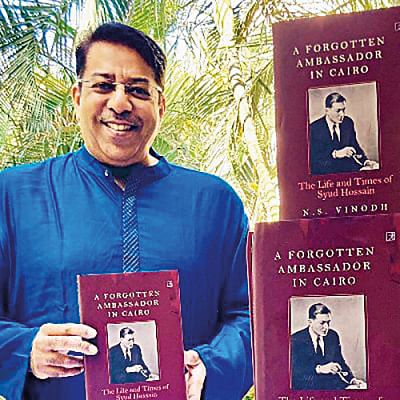The Tale of a Forgotten Ambassador: A rediscovery of the life of a patriot

N. S. Vinodh's newly published book A Forgotten Ambassador in Cairo is the outcome of a fortuitous event. In March 2018, the author was taken for an unscheduled visit to the tomb of an Indian Ambassador, in Cairo's "City of the Dead." He was led to a marble mausoleum that had an imposing appearance, in spite of being in a dilapidated condition. The mortal remains of Syud Hossain, India's first ambassador to Egypt lay under this neglected marble edifice.
Like most 21st century Indians, Vinodh knew next to nothing about the ambassador whose tomb he had accidently stumbled upon. The little that he did know was based on the scurrilous comments made by M. O. Mathai, the controversial private secretary to India's first Prime Minister, in his book My Years with Nehru. After his return to India Vinodh set out on a journey to discover more about the person, whose tomb he had visited in Cairo. His findings have taken shape in the form of a meticulously researched and highly readable historical biography.
Syud Hossain (1888-1949) was undoubtedly one of the most attractive and colourful public figures in the history of India in the 20th century. An exceptionally handsome man who epitomized everything the expression "a polished gentleman" connotes, scion of an illustrious family who kept company of the most distinguished persons of his time, an eloquent speaker who used his declamatory skills to advance the cause of India's independence, a formidable debater, a prolific writer who wielded a facile pen, a fearless journalist who exposed the hypocrisy of the claims of the British rulers of India and the injustice they inflicted on the Indians, a patriot whose secular nationalist credentials were impeccable and whose adherence to liberal democratic principles were well known, Syud Hossain is forgotten in the country he loved so dearly, the country he fought to free. What people do know about him is based on the disparaging piece on Syed Hossain in Mathai's My Years with Nehru, a book replete with scandalous stories. Vinodh's book on Syud Hossain fills the void in the historical literature of 20th century South Asia. This sympathetic account of Syud Hossain's life and career, sets the record straight about the historic role of an extraordinary individual. Vinodh's story of his forgotten ambassador is highly informative. He shows an astonishing perceptivity in his observations of the major events in which Syud Hossain was involved.
Vinodh begins his Ambassador's story in Calcutta where Syud Hossain was born and the surroundings amidst which he grew up. The peregrinations of Syud Hossain, the wanderer, begin when he went to Aligarh in his teens, for higher studies. A stint in the civil service followed. When Syud Hossain resigned from government service, he moved from the rural interior of Bengal in Rajshahi, to London, in England, at that time the centre of the universe. The ostensible purpose of Syud Hossain's journey to England was to become a barrister-at-law. However, he was more interested in the activities of journalists in London's Fleet Street. Syud Hossain left England in 1916, after spending six years there, without becoming a barrister. However, this English interlude in his life was an important part of the formative phase of the person he was to become. In London, Syud Hossain befriended Sarojini Naidu and Asaf Ali. It was in London that the suave and urbane Syud Hossain evolved and developed his eclectic liberal outlook and enlightened world view.
The India to which Syud Hossain returned was a country in ferment, transformed radically by the onset of World War I. The Indian National Congress (INC) was at that time spearheading India's movement towards independence. Syud Hossain became from 1916 onwards inextricably entangled in the activities of the INC. He joined the Bombay Chronicle, the mouthpiece of the INC as an apprentice to its editor B. G. Horniman. It was from his mentor Horniman, that Syud Hossain learnt his craft as a journalist. He soon made his mark in his new profession, and in the beginning of 1919, he was invited by Motilal Nehru, to become the editor of The Independent in Allahabad. He was given a princely salary of Rs 1,500 plus perks (for that period of time). The Independent attracted the attention of readers all over India, with its extensive coverage of the Jallianwala atrocity in Amritsar, in defiance of pressure from the powers that be. The dauntless editor of The Independent, however, could not continue his work in Allahabad. An incident took place that changed the course of Hossain's life.
The debonair 30 year old Syud Hossain, fell in love with, eloped and married Swarup Kumari alias Nan, the hauntingly beautiful daughter of his employer. When the patriarch of the Nehru family learnt about his daughter's runaway marriage, he was understandably furious. Gandhi was dismayed when he learnt about this clandestine marriage. As a result of the Mahatama's intercession, the marriage of Swarup Kumari and Syud Hossain was dissolved. Syud Hossain was instructed by Gandhi and Motilal Nehru to leave Allahabad, immediately and India soon. Syud Hossain, known to be an epicurean, accepted their verdict with stoic fortitude. He did not bear Gandhi any grudge, for terminating the romance of his life, and for banishing him from India. Swarup Kumari was taken to Gandhi's Ashram. After her marriage to Ranjit Pundit, she became known as Vijayalaxmi Pundit.
Syud Hossain left Allahbad at the end of 1919, proceeding to Bombay, from where he sailed to England. After a short stay in London, he sailed Westward, his destination this time was the United States of America. Towards the end of October 1921, Syud Hossain reached New York. The USA was at that time a "land of the free," only for its citizens of European extraction. The members of all coloured races were at the receiving end of racial prejudice. Syud Hossain was determined to improve the lot of the Asians living there and he did this with considerable success during the quarter century he lived in the US. His main objective, however, was to represent India's freedom movement in America. To his credit, it can be asserted that he was indisputably the pre-eminent spokesperson for the interests of India in the US during the inter-war years. As a freelance writer, and the editor of the New Orient, as a professor in California, and as an advisor to the US War Department from 1942, he was able to persuade the federal authorities and the intelligentsia in the US that India's independence was imperative for world peace. He debunked the anti-Indian British propaganda in the US and convincingly rebutted arguments of British apologists in that country. He spoke continuously on the "falsification of India's history, and the vilification of Indians by British imperialists."
Before the outbreak of World War II, Syud Hossain revisited India for a few months. During this period he was able to spend time with his dearest friends Sarojini Naidu and Asaf Ali. He also met the indomitable Subhas Bose, another heroic son of Bengal.
In 1945, Vijayalakshmi Pundit had become a widow. She was invited to visit the US by President Roosevelt. During this visit Vijayalakshmi went on a coast to coast lecture tour of the US, addressing American audiences. These lectures marked the beginning of her distinguished diplomatic career. While Vijayalakshmi was in America, Syud Hossain was constantly by her side. Their intimacy irked a section of Indians in the US, who complained to Gandhi about the matter.
In 1946 Syud Hossain was back in India. Before leaving the US, an open letter addressed to the British Premier Churchill that he wrote was published in the American Press. The letter was a vitriolic indictment of the mismanagement of India under Churchill's watch.
The freedom of India that Syud Hossain and others like him had worked to approximate was approaching. When it came, it was an anti-climax that brought no joy to his heart. Bloodshed, savagery and a division of the country accompanied India's independence. Syud Hossain expressed his anguish in an article soon after August 15, 1947, the title of which was "A Phyrric Victory."
After independence, Vijayalakshmi was appointed India's ambassador to USSR. Before leaving for Moscow she would meet Syud Hossain at the lobby of Delhi's Imperial Hotel. These meetings were not infrequent and noticed by many. Asaf Ali also left Delhi, having become India's first ambassador to the US. Before he proceeded to Washington. Both he and Syud Hossain spent some time with Sarojini Naidu who had become governor of UP, at the governor's residence in Lucknow. This was the last time the three friends were together.
Gandhi's assassination in January 1948, before Syud Hossain's departure to Cairo, to become India's first ambassador to Egypt was for Syud Hossain, the unkindest cut of all. He never felt that he was wronged by Gandhi. While in the US, he wrote a hagiographical book on the Mahatma. Syud Hossain was happy to be in Cairo. He was interested in the history and culture of Egypt. Vijaylaxmi came to see him briefly in January 1949. On February 25, 1949, Syud Hossain felt unwell in his room in Cairo's famous Shepherd's Hotel. He died the following day, in hospital. His friend, patron and defender, Sarojini Naidu, died a month later.
In Vinodh's portrayal of Syud Hossain, and the vicissitudes of his career Syud Hossain emerges as a truly cultured, though perhaps an over refined person. He strikes the reader as a generous, humane, kind and loyal individual, to whom honor was all. Syud Hossain, the Indian nationalist and citizen of the world merits remembrance. The role this liberal democrat and secular nationalist writer played in South Asia's struggle against British imperialism, needs to be noted in history books. I wish to wind up my observations on A Forgotten Ambassador in Cairo, with a comment on its author N. S. Vinodh who has made a valuable addition to our corpus of knowledge of the history of 20th century South Asia. A major writer has appeared in the firmament of the literature of historical biography in the subcontinent. His erudite, "must read" book on Syud Hossain, has to be followed by other equally readable scholarly works. The first historical biography written by him I hope, will not be his last.
I have read it with deep interest and recommend it highly to readers of historical literature.
Syud Marghub Murshed is a former civil servant.

 For all latest news, follow The Daily Star's Google News channel.
For all latest news, follow The Daily Star's Google News channel. 



Comments